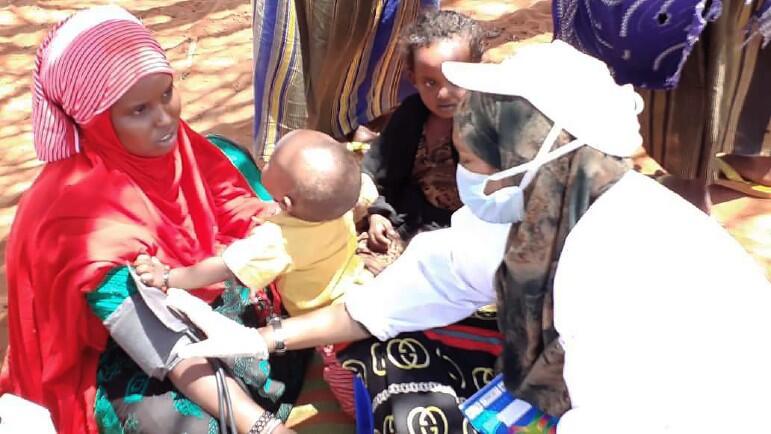Jamila Garad, 26, is a midwife who carries out outreach midwifery services voluntarily in Gurel Camp for Internally Displaced Persons (IDPs) and to the host community in villages close to the IDP camp. Ms. Garad graduated as a midwife in 2017 from Galgadud Midwifery School. The school receives financial and technical support from UNFPA Somalia.
“I have been practising as a midwife in a hospital in Galgudud and found out that many women coming to the hospital present a lot other pregnancy-related complications including severe anaemia which mostly lead to morbidity and death for mothers and babies at birth. I have been mobilizing fellow midwives to carry out the outreach services to provide women with antenatal and postnatal care within their communities and households,” says Ms. Garad.
She explains that the outreach services include reproductive health awareness-raising sessions, maternal nutrition, FGM prevention and the importance of facility-based delivery.
Somalia has one of the highest maternal mortality rate (MMR) in the world. The Somalia Health and Demographic Survey (SHDS) Report 2020 indicates that Somalia’s MMR is at 692 per 100,000 live births.
Ms. Garad explains that high levels of poverty, illiteracy, early pregnancy and the low value placed on women’s health, lack of female decision-making power over their health, and social and cultural norms associated with reproduction adversely affect decisions to seek health care and positive outcomes for mother and child.
“Now, the COVID-19 pandemic is posing even more challenges to maternal and child health in Somalia, and we’ve had to step up outreach services,” said Ms. Garad.
Generally, the collapse of the country’s health system due to ongoing conflict and the humanitarian situation has caused Somalia to have some of the worst health indicators in the world, according to UNFPA Somalia Midwifery Specialist Hawa Abdullahi Elmi.
“Currently COVID-19 is harming an already-challenging health system. The situation has been exacerbated due to restrictions on movement, lack of security in some areas but also increasingly conservative gender norms, harmful cultural practices such as female genital mutilation and early marriage and lack of access to SRH including family planning,” says Ms. Elmi.
The International Confederation of Midwives (ICM) indicates that women and marginalized groups are particularly ill-prepared for survival and recovery from a disaster. Women may also suffer from all forms of violence, especially when living in IDP camps and during human-induced disasters. All of these inter-related factors impact on the women’s reproductive health needs, health-seeking behaviour and access to health services, ultimately negatively impacting maternal and neonatal health, particularly during a crisis in humanitarian settings.
The UNFPA Somalia midwifery specialist explains that the development of Somalia’s health systems has mostly suffered from insufficient, inequitable, fragmented and largely privatised services where accessibility to SRH is very limited in hard to reach areas, especially during crises. “Midwives are the only available health cadres at the community level, particularly in rural areas,” says Ms. Elmi.
“UNFPA-supported midwifery schools offer quality midwifery training courses to young female candidates enrolled from rural setting who contribute to the rapid availability of quality midwifery care during a humanitarian crisis at the community level. This is done to increase the accessibility of dedicated, qualified maternal health care providers, in particular those with midwifery competencies,” she adds.
According to Ms. Elmi midwifery is the key cornerstone of Somalia’s reproductive, maternal, newborn, child and adolescent health. She said midwives are first-line maternal health providers who can reduce child and maternal mortality in the country. “When midwives are well trained, deployed and regulated, they can provide 87 percent of all essential services along the continuum of care,” she says.
Deputy Executive Director of the Somali Midwifery Association Ms. Fatima Mohamed says investing in midwifery education is crucial in strengthening the knowledge of midwives and ensuring life-saving services whilst building demand-creation for SRH services, including family planning. “Midwifery care is always mindful that normality can easily move into complications and even life-threatening events. The midwife must be equipped to respond to and deal with effectively and efficiently, particularly during a crisis,” says Ms. Mohamed.
Meanwhile, Ms. Garad and her team of community midwives continue on their quest to provide life-saving support during pregnancy and delivery while promoting COVID-19 prevention.
“We’re also doing our best to protect ourselves from getting infected. We’re operating at a time and places where midwives themselves are at risk of being exposed to the COVID-19 virus,” said Ms. Garad.
Inadequate availability of personal protective equipment (PPE) has increased fear among many midwives in performing their duties. Midwives often work long stressful shifts during which they may be preoccupied with the health of their families as well as their own and that of their patients. In the context of COVID-19, their work may also expose them to scenes of human suffering.
The COVID-19 pandemic has also challenged pre-service training institutions in Somalia, due to social distancing requirements. Many students have stopped face-to-face learning and started online classes which may hurt the teaching and learning process. In clinical teaching, it has been challenging to attach students to health facilities for clinical experience due to lack of PPE and absence of other precautionary steps against infection.
There is a large disparity in midwifery training, employment, deployment and distribution across the country and this is largely influenced by the number and quality of training institutions, health facilities, type and capacity of employers, compensation packages and prospects for career development. The COVID-19 pandemic has also brought challenges on employment opportunities for midwives due to travel restrictions which have made them fail to travel to regions that they could get employment.
---Pilirani Semu-Banda


